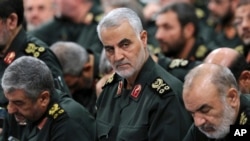A Tehran court has ordered the U.S. government to pay nearly $50 billion in damages for assassinating a top Iranian general nearly four years ago, the judiciary said Wednesday.
Then-U.S. President Donald Trump ordered a drone strike near Baghdad International Airport that killed General Qassem Soleimani, 62, and his Iraqi lieutenant, Abu Mahdi al-Muhandis, on January 3, 2020.
Days later, Iran retaliated by firing missiles at bases in Iraq housing American and other coalition troops. No U.S. personnel were killed, but Washington said dozens suffered traumatic brain injuries.
The Iranian judiciary's Mizan Online news agency said a Tehran court had sentenced the U.S. government to pay $49.7 billion in "material, moral and punitive damages" in response to a lawsuit filed by more than 3,300 Iranians.
The court found 42 individuals and legal persons guilty, including Trump, the U.S. government, former Secretary of State Mike Pompeo and former Defense Secretary Mark Esper, Mizan added.
Hero of Iran-Iraq War
Soleimani commanded the Quds Force, the foreign operations arm of the Islamic Revolutionary Guard Corps.
One of the country's most popular public figures, he spearheaded Iran's Middle East operations and was seen as a hero of the 1980-88 Iran-Iraq War.
Iranian courts have now handed down several rulings against the United States.
Last month, an Iranian court ordered the U.S. government to pay $420 million in compensation to victims of an abortive 1980 operation to free hostages held at the U.S. Embassy.
In August, a Tehran court demanded Washington pay $330 million in damages for "planning a coup" in 1980 against the fledgling Islamic Republic.
Those suits followed a series of multibillion-dollar compensation rulings against Tehran by U.S. courts.
In 2016, the U.S. Supreme Court ordered that Iranian assets frozen in the United States should be paid to victims of attacks Washington has blamed on Tehran, including the 1983 bombing of a U.S. Marine barracks in Beirut and a 1996 blast in Saudi Arabia.
Tehran denies all responsibility for the attacks.
It has appealed to international justice to help unlock funds of several Iranian individuals and companies that have been frozen by Washington.
In March, the International Court of Justice ruled that Washington's freezing of funds was "manifestly unreasonable." But it ruled it had no jurisdiction to unblock nearly $2 billion in Iranian Central Bank assets frozen by the United States.
Iran and Washington have had no diplomatic relations since the aftermath of the 1979 revolution.




